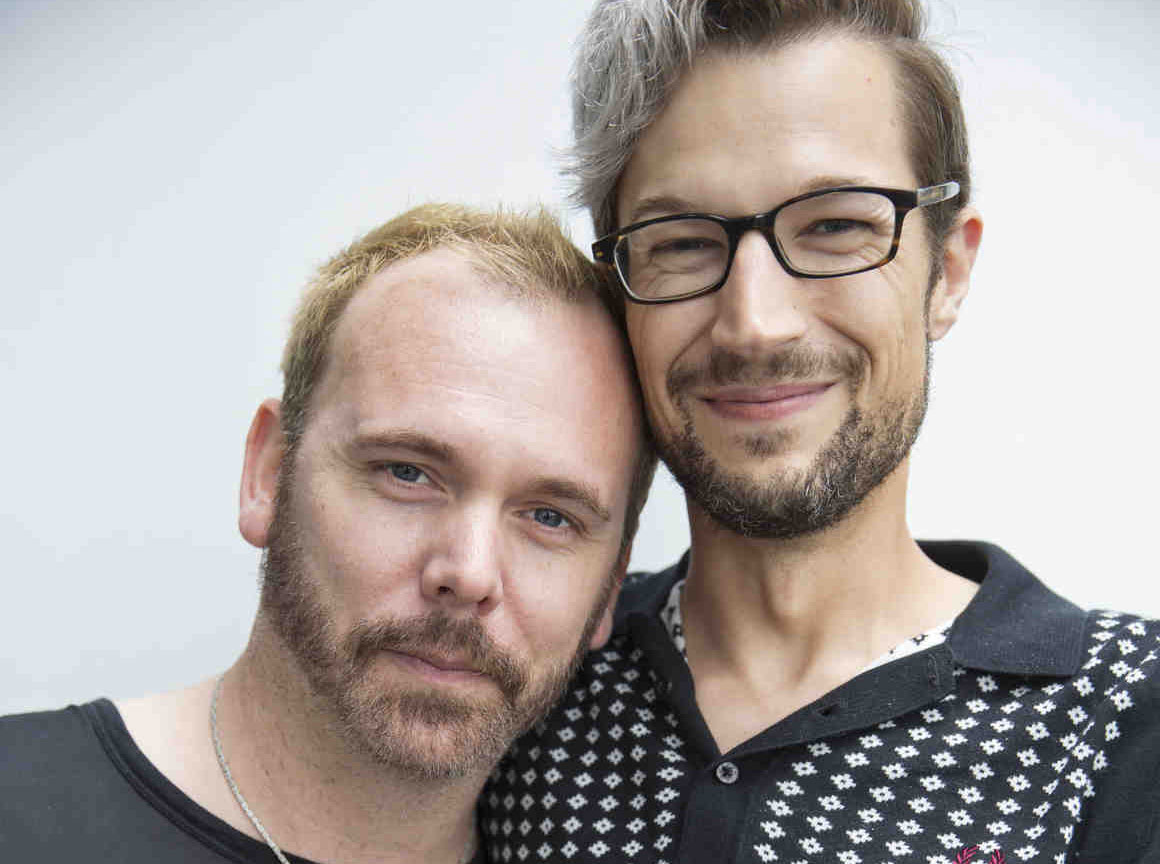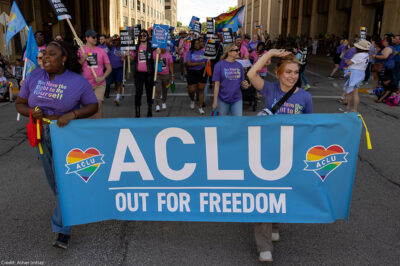Business, Civil Rights, and Legal Voices File Briefs in Supreme Court, Defending Rights of Same-Sex Couple Discriminated Against by Business
WASHINGTON — Individuals and institutions from across the country representing a diverse cross-section of interests, perspectives, and concerns filed friend-of-court briefs today with the Supreme Court in support of Charlie Craig and David Mullins, a same-sex couple refused service by a Colorado bakery that claimed that selling them a wedding cake would violate the owner’s religious beliefs and artistic freedom.
The case, Masterpiece Cakeshop v. Colorado Civil Rights Commission, has sparked pushback and warning from civil rights leaders, legal scholars, business voices, faith leaders, and LGBT advocates across the country. The couple is being represented by the American Civil Liberties Union, which will appear before the court on December 5 for oral arguments.
Today’s filing of friend-of-the-court briefs showcases the diversity of voices supporting the couple at the center of the case. The list of those filing briefs includes:
- More than 35 national business leaders (including Citi, Marriott, and Apple, among many others)
- The nation’s most prominent civil rights voices (including NAACP LDF, Lawyers’ Committee for Civil Rights Under Law, and the Leadership Conference for Civil and Human Rights)
- Leading legal scholars and experts
- Almost 1,300 faith leaders
- More than 200 members of Congress (led by Sen. Tammy Baldwin and Rep. Sean Patrick Maloney)
- State attorneys general from across the country (including Republican AG Cynthia Coffman of Colorado)
- Over 150 mayors of cities and municipalities from coast to coast
- Hundreds of celebrity chefs and restaurateurs (Jose Andres, Anthony Bourdain, Padma Lakshmi, and Carla Hall)
- The nation’s leading LGBT rights advocacy organizations
- Top medical and health organizations
- Women’s health advocates
- Impacted people
The complete list of supporters filing briefs can be found here.
“Nobody should be turned away from a business, denied service, fired from their job, or evicted from their home simply because of who they are,” said Louise Melling, deputy legal director at the ACLU. “The issue in this case is whether there is a constitutional right to discriminate. Such a ruling would turn the constitution’s promise of equal treatment under the law on its head. It would have implications far beyond LGBT people, and would put into jeopardy long-standing laws against discrimination across the country.”
Civil rights leaders have also rallied around the case, arguing that a ruling in favor of the bakery would create a slippery slope that threatens to have consequences reaching people far beyond the LGBT community. Briefs filed by the NAACP Legal Defense Fund, the Leadership Conference on Civil and Human Rights, and Lawyers Committee for Civil Rights Under Law highlight the dangers this case presents to groups who have been traditionally discriminated against.
Rep. John Lewis, one of the nation’s most prominent civil rights voices said, “As a nation based on laws, we must move forward, not backwards. I remember the signs that said ‘whites only’ and ‘colored only.’ I remember when businesses open to the public engaged in blatant discrimination against people based on religion, race, and gender. To allow any business discriminate based on sexual orientation in this day and age is simply wrong and would be a step back to darker time. We have an obligation to speak up and speak out for the rights of each and every person to be treated with dignity and respect.”
Legal scholars have also lined up to warn of the constitutional implications the case would have if the court rules in the favor of the bakery, arguing that distorting notions of First Amendment protections to justify discrimination will weaken the foundation of our nation’s bedrock principles and overall justice system.
“Discrimination in the marketplace has never been accorded affirmative constitutional protections,” said Tobias Barrington Wolff of the University of Pennsylvania Law School. “A business does not receive a special exemption from ordinary commercial regulation simply because it sells goods or services with some creative or expressive component. That is true for commercial law firms, it is true for private schools, and it is true for bakeries. The Supreme Court has been clear and consistent, and it should adhere to its precedents.”
The nation’s leading LGBT rights organizations have also filed briefs with the court today, arguing that this case is yet another example of how anti-LGBT groups are increasingly exploiting notions of religious and speech protections to justify discrimination. They also argue that these groups’ efforts are part of a much larger, coordinated attack against LGBT people intended to unravel and undermine important protections that have been won in recent years.
“Imagine how you would feel if you were kicked out of a business simply because the owner didn’t want to serve ‘people like you.’ It’s shocking to realize that this kind of discrimination still happens to LGBT people today — causing humiliation, embarrassment, and fear,” said Rachel B. Tiven of Lambda Legal. “Colorado is one of a number of states that protects LGBT people from this kind of discrimination, but those protections are under attack. A ruling in favor of the bakery would undermine and unravel important protections for LGBT people, and would have consequences for people far beyond the LGBT community.”
Colorado’s own Republican attorney general weighed in, arguing that a ruling in favor of the bakery in this case would undermine nondiscrimination laws which were created to protect against these types of aggressions to begin with.
“Everyone agrees that the government cannot force people or entities to ‘speak,’” stated the brief filed by Colorado Attorney General Cynthia Coffman. “School children cannot be punished for refusing to say the pledge of allegiance. A newspaper cannot be compelled to print a politician’s editorial. But those scenarios are nothing like the circumstances here, in which a state law has merely prohibited discriminatory denials of service by businesses open to the public. If a retail bakery will offer a white, three-tiered cake to one customer, it has no constitutional right to refuse to sell the same cake to the next customer because he happens to be African-American, Jewish, or gay.”
More information about the case, as well as a collection of all of the briefs filed today, can be found here:
https://www.aclu.org/cases/charlie-craig-and-david-mullins-v-masterpiece-cakeshop
Stay Informed
Sign up to be the first to hear about how to take action.



